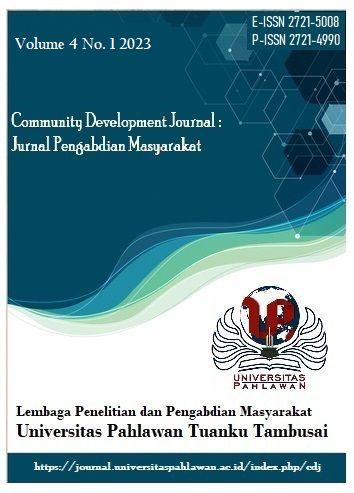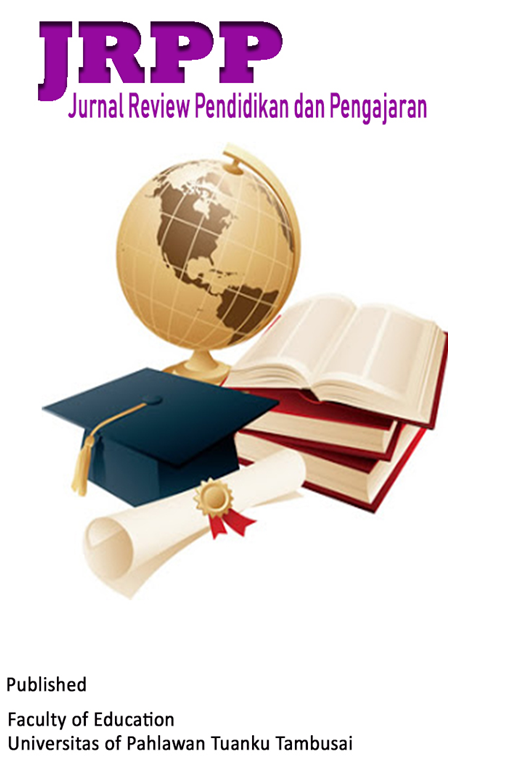IMPLEMENTASI BIMBINGAN KARIER BERBASIS LIFE SKILL DALAM MENINGKATKAN MOTIVASI WIRAUSAHA PADA REMAJA
DOI:
https://doi.org/10.31004/cdj.v4i1.12392Keywords:
Bimbingan Karier, Life Skill, Motivasi, WirausahaAbstract
Abstrak Perkembangan ilmu pengetahuan, teknologi dan seni (IPTEKS) telah membawa perubahan di hampir semua aspek kehidupan manusia. Berbagai perubahan yang terjadi saat ini telah membawa manusia ke dalam suatu era persaingan di era global. Hal ini perlu disikapi dengan cepat oleh berbagai pihak dalam upaya mengantisipasi derasnya perubahan zaman terutama pada generasi milenial. Berbagai upaya untuk menyongsong perubahan yang terus terjadi di tengah-tengah kehidupan saat ini terus dilakukan. Upaya ini dilakukan agar tercipta sumber daya manusia (SDM) berkualitas yang diharapkan berperan aktif dalam menyongsong perubahan yang terjadi di lingkungan masyarakat. Tujuan pengabdian ini adalah sebagai upaya dalam memberikan bimbingan dan arahan jenjang karier pada kaum remaja berbasis life skill melalui peningkatan motivasi dalam berwirausaha. Yang menjadi kelompok sasaran dalam kegiatan ini adalah para Remaja kurang lebih 15 anak. Metode yang digunakan adalah metode ceramah dan diskusi dimana peserta kegiatan program pengabdian akan dibimbing dalam setiap kegiatan oleh pemateri. Target luaran yang dihasilkan dari kegiatan ini adalah mempersiapkan dan mengembangkan kreatifitas dalam menata karier para remaja dengan pembekalan dasar-dasar ilmu kewirausahaan untuk menumbuhkan jiwa wirausaha pada remaja. Kata kunci: bimbingan karier, life skill, motivasi, wirausaha Abstract The development of science, technology and art (IPTEKS) has brought changes in almost all aspects of human life. Various changes that occur today have brought humans into an era of competition in the global era. This needs to be addressed quickly by various parties in an effort to anticipate the swift changes of the times, especially in the millennial generation. Various efforts to meet the changes that continue to occur in the midst of life today are continuously being carried out. This effort is made in order to create quality human resources (HR) who are expected to play an active role in welcoming changes that occur in the community. The purpose of this service is as an effort to provide guidance and direction for career paths for youth based on life skills through increasing motivation in entrepreneurship. The target group in this activity are teenagers, approximately 15 children. The method used is the lecture and discussion method where participants in the service program activities will be guided in each activity by the speaker. The output target resulting from this activity is to prepare and develop creativity in managing youth careers by providing the basics of entrepreneurship to foster an entrepreneurial spirit in adolescents. Keywords: career guidance, life skills, motivation, entrepreneurReferences
Baqir, M. (2020). Riset SEA Insights: 45 Persen Pengusaha Aktif Berjualan Online. Retrieved from www.bisnis.tempo.co: https://bisnis.tempo.co/read/1360485/risetsea-insights-45-persen-pengusaha-aktif-berjualan-online
Dariyo. (2003). Psikologi Perkembangan Dewasa Muda. Jakarta: PT Gramedia Widiasarana.
Dillard, J.M. (1985). Life Long Career Planning. Colombus. Ohio : Bell & Howell Company.
Hyot, K.B., Wickwire, P.N. (2001). Knowledge-Information-Service Era Change in Work and Education and the Changing Role of the School Counselor in Career Education. The Career Development Quarterly, Vol. 49. No. 3
Osipow, S.H., (1983). Theories of Career Development. New Jersey: PrenticeHall Inc.
Patton, W. & Lokan, J. (2001). Prespectives on Donald Super’s Construct of Career Maturity. International Journal for Education and Vocational Guidence. 1, 31-48.
Riyadi, A.R. (2006). Pengembangan Alat Ukur Kematangan Karir Siswa Sekolah Menengah Atas. Skripsi pada Jurusan PPB FIP UPI. Bandung : tidak diterbitkan.
Savickas, M.L. (2001). A Developmental Perspective on Vocational behaviour : Career Patern, Salience, and Themes. International Journal for Education and Vocational Guidence. 1, 31-48
Sharf, R.S. (1992). Applying Career Development Theory to Counseling. California : Woodswoth, Inc.
Super, D. E., Thompson, A. S., & Lindeman, R. H. (1988). Adult Career Concerns Inventory: Manual for research and exploratory use in counselling. Palo Alto, CA: Consulting Psychologists Press.
Whiston, S.C. (2000). Principles and Applications of Assessment in Counseling. United States : Brooks/Cole.
Winkel, W.S. (1997). Bimbingan dan Konseling di Institusi Pendidikan. (Edisi Revisi). Jakarta: PT Gramedia Widia Sarana Indonesia.
Yusuf, Syamsu. (2009). Program Bimbingan dan Konseling di Sekolah. Bandung: Rizqi Press.
Zunker, V.G., & Osborn, D.S. (2002). Using Career Development Inventories. [Online]. http://web.odu.edu.

Downloads
Published
How to Cite
Issue
Section
License
Copyright (c) 2023 Sri Mulyati, Iskandar Iskandar, Iyan Setiawan

This work is licensed under a Creative Commons Attribution-ShareAlike 4.0 International License.















